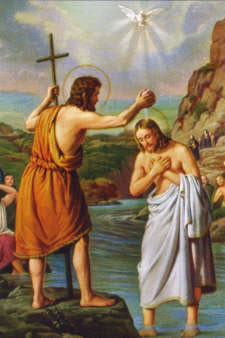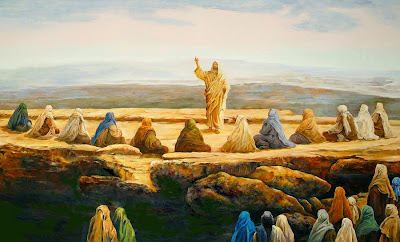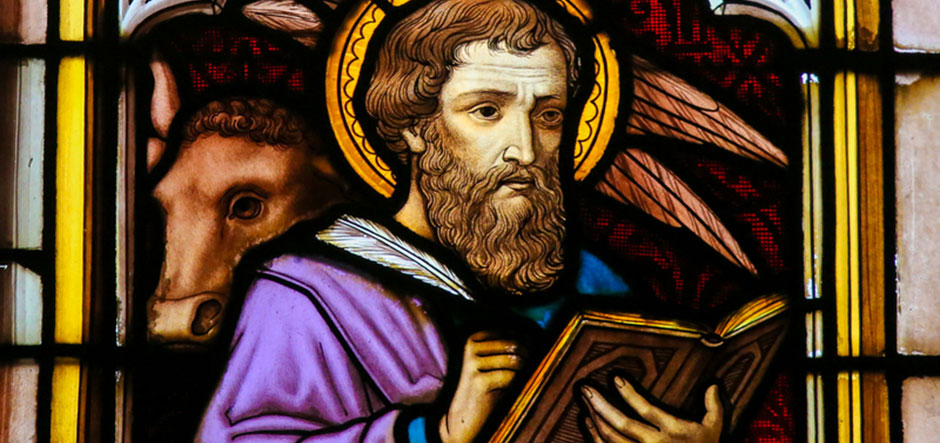As some may know or should remember
I am a Lay Dominican. I’m about six
months away from my final promise. Each
chapter in the Lay Dominican fraternities has an apostolate, that is a spiritual
work, they do together as a ministry.
Our fraternity’s apostolate is to provide Christian studies to lay people. We put on Catholic studies twice a year
through Zoom, once during
Advent and once during Lent. This past
Lent we put on a Bible study on the Gospel of Luke. We used Ascension Press’s study on the Gospel
of Luke which you can preview here.
The Ascension Press Bible Studies come with a session video and a workbook. The workbook has preliminary readings to go with go with the readings in the Gospel itself, and it has a series of questions for each participant to answer. How we ran the study was that we started with a summary of the preliminary workbook readings and then openly discussed our answers to the workbook questions. Then we put on the session video, which was about a half hour long, and closed with a group discussion of the video. Each session took about an hour and a half, and we put on a session once a week for the eight sessions of this course. We’ve done a few of these now, and I thought this study was the best we have done to date. And this was free for the participants. If they wished, they could have bought the workbook, but just listening in was adequate to learn. We bought the video and shared it on Zoom.
What I am posting here are the workbook questions and my answers. I don’t claim my answers are comprehensive. They are just a sentence or two, but I think by reading the Gospel of Luke and answering the questions yourself, you will come away with a good understanding of that Gospel. There are 42 questions, six questions for each of the seven sessions of two through eight. There were no questions for the first, introductory session.
This topic will be divided into two posts.
###
Session 2:
Luke Chapters 1 – 3
1. Luke 1 presents a parallel contrast between Zecharia and Mary. The angel Gabriel appears to both, with a similar message for each of them. How does Zecharia’s reaction to Gabriel’s news compare to Mary’s? What is the essential difference between their responses? What are the results of their individual responses?
My answer: Zecharia questions God’s
ability to do the impossible while Mary questions the method. Mary believes in God’s ability but wonders
how it can come about. Zecharia is
punished with a temporary inability to speak while Mary is heralded.
2. The first chapter of 1 Samuel begins with a barren woman, Hannah, praying for a son. The Lord hears her prayer, and Hannah bears Samuel, who will become a great prophet and the last judge of Israel. Read Hannah’s prayer in 1 Sam 2:1-10, and then compare with Mary’s in Lk 1:46-55. In what ways are these prayers similar?
My answer: Both are exultations of
their lowly state in the Lord. Both
overturn the mighty in power to make the lowly high in state. The proud are brought down while the humble
are raised.
3. Lk 2:6-12 depicts Jesus being born in utter poverty. When God chose to come among us, in his providence he chose to be destitute. Why do you think God’s Son chose to be born in such poverty?
My answer: He chose to be born poor as the low in order to redeem all. He chose to go against earthly power and earthly values. Blessed are the poor.
4. Lk 2:41-52 describes how Mary and Joseph lost Jesus for three days after they came to Jerusalem for the feast of Passover. What are some ways in which we can lose Jesus for a time? How can we increase our joy at finding him again?
My answer: We can lose faith, we
can turn to sin, we can slide into acedia (sloth). Through the Holy Spirit, we receive joy in
reconciliation and return to faith.
5. Jeremiah and Ezekial were prophets before and during the time of the Babylonian Exile. Compare the introductions of Jerimiah and Ezekial (Jer 1:1-3; Ezk 1:1-3) with that of John the Baptist (Lk 3:1-6). What are some similarities between these scripture passages? Why do you think Luke introduces John the Baptist in this way?
My answer: All three are situated
in a specific time under the reign of a particular ruler. Luke introduces Joh in this way to allude to
the other prophets and so designate John as a prophet.
6. Lk 3:21-22. Who is present during Jesus’ baptism? Who (or what?) is specifically mentioned? What can we learn about the nature of God from this moment in Luke’s Gospel?
My answer: God the father and the Holy Spirit are present while Jesus is getting baptized. What is specifically mentioned is that Jesus is identified as God’s beloved Son. From this we can infer the Trinity.
###
Session 3:
Luke Chapters 4 – 6
1. The prophesy recorded in Isaiah 61 refers to “the year of the LORD’s favor” (“the acceptable year of the Lord in Lk 4:19). This is the Sabbath year (Year of Jubilee), during which slaves were to be released and the land would rest and be restored. How does Isaiah 61 relate to the scene in Lk 4:14-30? What is significant about Jesus’ teaching, and how do his listeners respond?
My answer: Both are alluding to the
Jubilee year. Jesus is particularly
pointed to showing God’s favor to non-Jews.
They reject Jesus and show that no prophet is accepted in his country.
2. Why does Jesus so frequently go to desert places as He does in Lk 4:42? What significance does this hold for our personal prayer lives?
Jesus isolates Himself to pray and
be free of constraints. One needs to set
time aside to pray and commune with God, creating an whole integrity and free
to pray.
3. In Jesus’ day it was customary to fish at night on the Lake of Gennesaret. In Lk 5:1-11, we find that Simon Peter and his companions have fished all night without success. Jesus tells them to try one more time; in obeying him, they catch a multitude of fish. Why does this lead Simon to exclaim , “Depart from me, for I am a sinful man, O Lord” (Lk 5:8)
My answer: Because Simon realizes
he is in the shadow of holiness and transcendence. He realizes he is unworthy to be before
Jesus.
4. Skeptics sometimes claim that Jesus never said, “I am God.” Yet not only are there many places where He affirms his divine identity when asked (as in Mk 14:61-62); he also says and does things that make it clear he is claiming to be God. In Lk 5:20-26, how do Jesus’ words and actions here demonstrate his claim to be God?
My answer: He specifically forgives sins and says He is the “Son of Man.” Only God can forgive sins, so He acknowledges He is God. The miracle also reveals He is God as a sign that points to His authority.
5. Compare Mt 5:1-12 and Lk 6:20-26. What are some of the differences between these accounts.
My answer: There are eight
beatitudes in Matthew, only four in Luke.
Luke has corresponding woes. Luke
is less spiritual and earthlier. In
Matthew Jesus is speaking to a gathered crowd while in Luke he is speaking to
the apostles.
6. Lk 6:27-36. If we are called to imitate God, what does Jesus’ command here tell us about God?
My answer: God is love, meekness, self-sacrifice, mercy, generous giving; God is compassionate.
###
Session 4:
Luke Chapters 7 – 9
1. How does the centurion’s response to Jesus (Lk 7:1-10) underscore his great faith? How can you apply this lesson to your life?
My answer: As a military leader,
the centurion believes that a command given will be obeyed. If Jesus says “the word” the command will be
fulfilled.
2. In Lk 7:18-23, we read that John the Baptist sent two of his followers to Jesus, asking if he really was the one “who is to come” or if they should “look for another” (Lk 7:19). What are we to make of Jesus’ response?
My answer: Jesus quotes and
performs the same miracles mentioned in Isaiah, that the Messiah was to
perform. John the Baptist would
recognize the allusion.
3. a. Women were somewhat ostracized in antiquity. They were even barred from serving as witnesses in many ancient courtrooms. With that in mind, what does Lk 8:1-3 tell us about Jesus and His relationship with women?
My answer: Jesus was not a male chauvinist. He kept women in His company, which was unusual for men and women to mix in His culture. For Jesus, women had dignity.
3. b. What conclusions can be drawn from Luke’s account of Jesus’ calming the storm on the sea (Lk 8:22-25)?
My answer: Jesus has power over
nature. Jesus has power over our
personal storms.
4. Notice the reaction of many people after Jesus heals the Gerasene demoniac (Lk 8:26-39). In what ways might we react in a similar way to Jesus?
My answer: Since pigs were not clean for Jews, it makes
sense to send the demons, who are unclean, into the swine. Unclean swine go with unclean demons.
5. a. See 1 Kings 17:8-24. What similarities do you notice between Jesus and Elijah?
My answer: Both perform the miracles of multiplying bread and the curing of a boy.
5. b. In Lk 9:10-17, we read how Jesus works a miracle by feeding more than five thousand people with a few loaves of bread. How does this relate to the mystery of the Eucharist?
My answer: The archetype for both is the manna from
heaven and both have supernatural events occur through the substance of bread.
6. In Lk 9:57-62, Jesus meets several would-be followers who are caught between their desire to follow Jesus and earthly matters. How do their dilemmas relate to concerns you face in your own life, and how is Jesus calling you to surrender these concerns to him? Also, earlier in Luke, Jesus explains that any who wish to follow him must take up their crosses daily (Lk 9:23). What crosses can you voluntarily take up as part of your Christian life?
My answer: Jesus is calling me to surrender my attachments. Let them go! The daily crosses I must accept are that of being a spouse, a father, and a son.
###
Sessions five through eight will be
in Post #2 on this topic coming shortly.




No comments:
Post a Comment